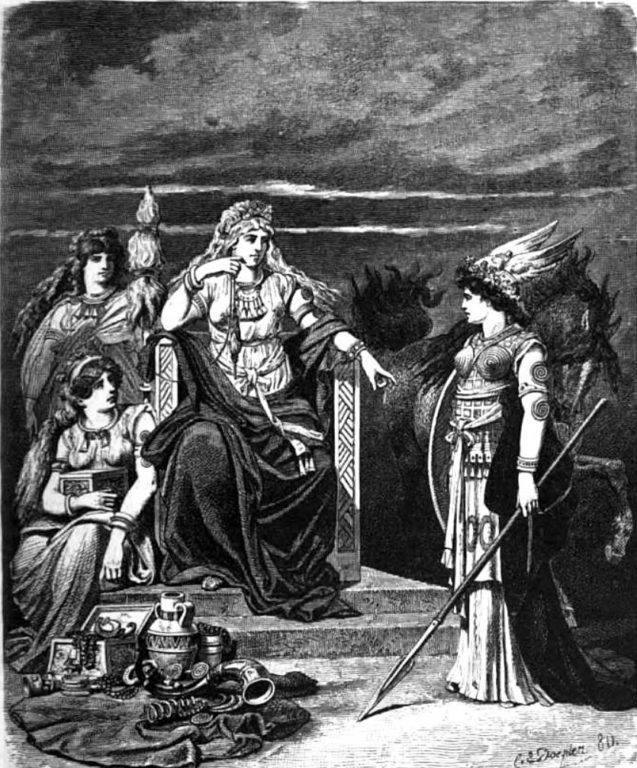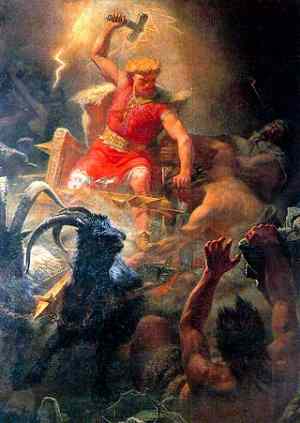
The Anglo Saxons entered Britain as pagans, but gradually as time passed and they inhabited themselves in the Anglo Saxon kingdoms of Britain, they were slowly converted to Christianity. It is also believed that there are still few numbers of customs which are presently followed in England. These customs have actually come in through the festivals of the pagans when they were in Britain. Thus, coming to the fact that what was the religion of the Anglo Saxons, well they were not Christians, but were later converted into Christians.
Anglo Saxon Religion and Beliefs
Contents
The Anglo Saxons believed in the worshipping of Pagan gods. Thus, the perfect answer to what was the Anglo Saxons religion would be the believers or the worshippers of the Pagan Gods. This is another reason why they were named ‘Pagans’.
Pagans worshipped a lot of pagan gods when it came to numbers. Actually, there is a specific reason behind it. According to the belief of the pagans, each Pagan god use to control a specific time or a specific part or a specific activity of your days. The aspects of our everyday life which used to be controlled by these Pagan gods were believed to be family, love, wisdom, weather, day and night, growing of the crops, healing, metal works and many others.
Anglo Saxon Religion Facts
Amongst the facts of the Anglo Saxons religion, one was that each god was known for a particular characteristic which gave them a particular name.
Following are the name of the Pagan Gods and what they were known as:
- Balder– God of Immortality
- Frigg– Goddess of Love
- Loki– God of Cunning
- Thunor– God of Thunder
- Wade– God of the Sea
- Woden– Chief God
- Eostre- Goddess of Birth
- Hel– Goddess of Death
- Saxnot– God of Family
- Tiw– God of War
- Wayland– God of Metalworking
The second and yet another important fact according to the Pagan’s belief was that every day of the week were named after a specific god.

Following are the days of the week named after the respective god:
- Monday– The Day of the Moon or the Moon’s Day
- Tuesday– The Day of the God of War, Tiw or Tiw’s Day
- Wednesday– The Day of the Chief God, Woden or Woden’s Day
- Thursday– The Day of the God of Thunder, Thor or Thor’s Day
- Friday– The Day of the Goddess of Love, Frigg or Frigg’s Day
- Saturday– The Day of the Roman God, Saturn
- Sunday– The Day of the Sun
Along with the above mentioned two facts, there are many more facts regarding the Pagan’s belief on the Pagan Gods.
From the Pagan’s Religion to Christianity
Though the Anglo Saxon pagan religion was indeed a very strong religion on which Pagan’s believed, yet people slowly started converting to Christians. The entire process began about 1400 years ago. A missionary was sent to England from Rome which was initiated by the Pope of Rome. The main motive for the initiation of this missionary was to change the old Anglo Saxon religion of believing in Pagan Gods to Christianity.
Augustine, a monk sent by the Rome of Pope to England, first entered in the southern parts of England. There Augustine sat with the King of Kent, Ethelbert and converted him to a Christian. Ethelbert was the first king whom Augustine successfully converted into a Christian. This followed by the citizens of Kent who were then converted to Christianity.
After this, the Pope of Rome decided to make Augustine the Bishop. Ethelbert, the King of Kent granted Augustine the permission and allowed him in setting up a church for worship in Canterbury. Christianity then slowly spread over entire England and slowly Pagan temples were being converted to Christian churches. This was the transition of the religion in Anglo Saxon times.
Anglo Saxon Religion in Beowulf
According to the theories of Anglo Saxon religion Beowulf and the historical circumstances of the creation, Beowulf had a very straightforward behaviour towards religion. As per the religion in Beowulf, the scholarship regarding the same had already touched the extremities. The main debate held on the religion in Beowulf is regarding the interpretation between this being considered as a work of the allegory of Christianity or being considered as a work or an elemental expression on the beliefs which were held by the Pagans.
Is the religion in Beowulf a Pagan work? If we have a look at the 20th century, then the scholarship on religion in Beowulf was interpreted as a theory that the concerned poem is essentially a work of the Pagans, having the colours of Christianity towards the later scribes. This prolonged for about the entire first half of the 20th century. There was one scholar who explained the theory of Christianity in the religion in Beowulf as an adulterating, late and a deleterious influence on the Beowulf.
Is the religion in Beowulf a Christian work? The point that the theory of religion in Beowulf was totally a work of an author of Christian background came into existence from the middle of the 20th century. However, it was shown that there was no deny in the origination of the theory of religion in Beowulf being in the Pagan times. But, the actual work regarding the theory of religion in Beowulf was done by a scribe of the Christian background.
Culture of Anglo Saxons Religion
Just similar to the Greeks and the Vikings, Anglo Saxons were highly superstitious and also believed in many lucky charms. The Anglo Saxons used to follow poems, rhymes, jewels and stones. The idea of the Anglo Saxons was that these could protect them from many sicknesses and evil spirits trying to harm them.
There were also several monasteries of the Anglo Saxons. The monks and the nuns used to reside in these monasteries and used to spend their time with their prayers. Apart from their prayers, the monks and the nuns of these monasteries used to study and also work in the fields and many related workshops.